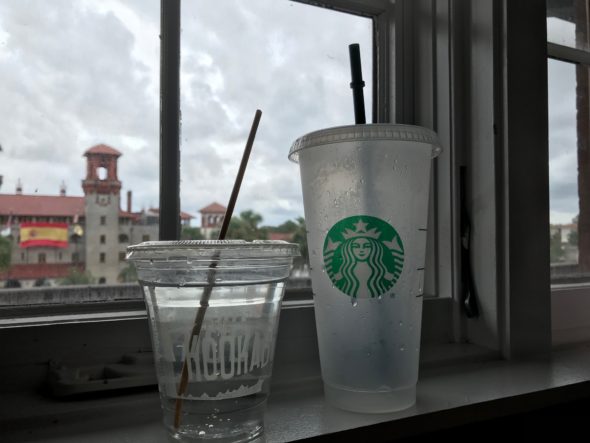By Alena Burns | gargoyle@flagler.edu

When a video of a turtle choking on a plastic straw went viral in June of 2018, people started to take action. Single-use plastic has been banned and replaced across the nation in response to the uproar, but is it too late?
Incidents like this have been part of the catalyst for a number of communities and cities to begin banning or replacing single-use plastics. For coastal cities like St. Augustine Beach, the reality of climate change and its effects are kick-starting new plans and ideas to prevent harm not only to the turtles, but for all other life on Earth.
The city of St. Augustine Beach issued a ban on single-use plastic and styrofoam items in July of 2019 and will be enacted starting Jan. 1st, 2020. The city decided to enact this ban after environmental advocates urged for the beach to reduce the amount of single-use plastics produced and used.
With organizations like the United Nations saying there is only have 11 years until the effects of climate change are irreversible, local restaurants and businesses in and around this city are responding.
Restaurants such as The Thai House, Prohibition Kitchen and several Starbucks locations are trying to help out by replacing and removing plastic straws. The Kookaburra, a local coffee shop, started offering plastic alternatives long before the ban.
“The hay straws are pretty recent, but it wasn’t because of the plastic ban,” said Suzie, a barista at the coffee shop.
“We did it mainly to help save the environment, so we got hay and corn straws around two years ago.”
While their plastic alternatives are free for consumers, some places are selling them for profit. Flagler College is one of these places. At their Legacy Store located on St. George Street, there is a four pack of metal straws for $9.99.
According to Haven Burney, a cashier at the store, they started selling them at the beginning of June. “The [metal] straws weren’t that big of a surprise, just because it became a huge trend to get reusable stuff,” she said.
The United Kingdom recently enacted a plastic ban as part of a 25-year plan. Their goal is to have no unavoidable waste by 2042. To get this project rolling, microbeads found in personal care items have been banned, plan to stop selling conventional petrol and diesel cars by 2040, eliminate illegal dump sites and more.
Plastic bans such as these are useful to the environment as climate change grows inevitable as the chemicals and physical characteristics of them are hard to degrade, according to the European Union. These items are harmful to the ocean and marine life found within, the ozone layer of the planet, and even affect the quality of soil levels. This is kickstarting the sale of reusable products across the globe.
Is the ban creating more room for company profit? Reusable coffee cups, recycled or bamboo toothbrushes, exclusive sneaker collections and more are all out there for consumers to buy.
On the surface, it could be seen as a way to help sustain the environment, but it could also be a way to ease a guilty conscience. While these companies are profiting off of these reusable items, it is effective, especially for millenials.
GlobalWebIndex, a market research company, found that 61 percent of millenials are the most likely generation to spend more money on eco-friendly products in 2018. Generation Z, which includes people between ages 16 and 21, were close behind at 58 percent. From this, it can be inferred that long-term changes may help the planet become greener.
However, while some may see bans like St. Augustine’s Beach’s as a step in the right direction, it may not last forever. According to The St. Augustine Record, the Florida Retail Federation has filed a lawsuit stating that local governments are not legally allowed to ban products like this as it violates state statutes. This is causing several cities to repeal their single-use plastic bans.
Gainesville, however, is not complying and said that they will welcome a lawsuit if it comes. Saint Johns County resident Rebecca Knott feels as though St. Augustine Beach should not back down either.
“There are so many reusable options which can easily replace those one-time use plastics,” she said.
“That stuff is also hurting the environment and affecting our future, whether you want to admit that or not.”



Be the first to comment on "Plastic Bans and Their Societal Effects"